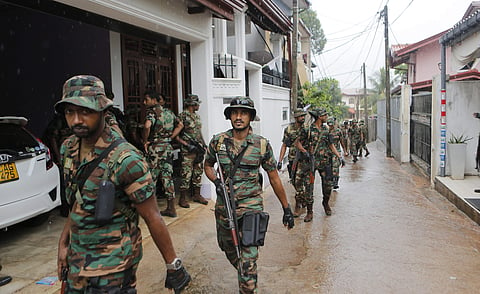

COLOMBO: Sri Lanka's Muslim minorities have suffered consistent discrimination, harassment and violence since 2013, culminating in the adoption of government policies explicitly targeting them, human rights group Amnesty International has said.
The report 'From Burning Houses to Burning Bodies: Anti-Muslim Harassment, Discrimination and Violence in Sri Lanka,' was published on Sunday by the UK-based human rights agency.
It asserts to trace the development of anti-Muslim sentiment in Sri Lanka, "amid surging Sinhala-Buddhist nationalism".
The document cites "series of mob attacks committed with impunity", forced cremation of Muslim COVID-19 victims, ongoing proposals to ban 'niqab' (face veil) and 'madrasas' (religious schools) and other such "discriminatory" measures, as steps consistent with harassment and violence on the minority group.
"While anti-Muslim sentiment in Sri Lanka is nothing new, the situation has regressed sharply in recent years. Incidents of violence against Muslims, committed with the tacit approval of the authorities, have occurred with alarming frequency. This has been accompanied by the adoption by the current government of rhetoric and policies that have been openly hostile to Muslims," said Amnesty International, deputy secretary-general Kyle Ward.
"The Sri Lankan authorities must break this alarming trend and uphold their duty to protect Muslims from further attacks, hold perpetrators accountable and end the use of government policies to target, harass and discriminate against the Muslim community."
The report says incidents of violence towards Muslims have risen in frequency and intensity since 2013, with a series of flashpoints in which attackers and those responsible for hate speeches have enjoyed impunity for their actions.
This escalating hostility began with the anti-halal campaign when Sinhala Buddhist nationalist groups successfully lobbied to end the halal certification on food items, which marks foods permissible for consumption by Muslims in accordance with Islamic scripture and customs.
After months of protests by Buddhist groups, Islamic clerics in Sri Lanka in 2013 had announced the withdrawal of 'halal' certification in the interest of communal harmony.
However, the Amnesty report said the campaign gave rise to a number of attacks on mosques and Muslim businesses and there was lack of accountability on nabbing persons responsible for these acts, signalling to others that acts of violence against Muslims could be committed with impunity.
The following year, anti-Muslim riots in the southern coastal town of Aluthgama began after a Sinhala Buddhist nationalist group held a rally in the town, the non-governmental organisation said.
"Here too, perpetrators of violence enjoyed impunity and authorities failed to deliver justice to victims," the report said.
Referring to the 2019 Easter Sunday attacks, the report said hostility towards Muslims increased markedly after the bombings which killed over 258 people.
The April 21, 2019 attacks were carried out by the local Islamist extremist group National Thawheed Jamaat (NTJ), which has links to the ISIS, tearing through three churches and as many luxury hotels.
The deceased included 11 Indians and more than 500 people were injured.
The Amnesty report accused the current government, led by President Gotabaya Rajapaksa, of making the Muslim population a "target and scapegoat" to distract from political and economic issues.
"This was evident in the mandatory cremation policy on the disposal of the bodies of COVID-19 victims, which was implemented despite cremation being expressly forbidden in Islam, and a lack of scientific evidence to substantiate the claims that burying victims would further the spread of the disease."
At the start of the COVID-19 outbreak in the island nation, authorities in May 2020 enforced a mandatory order to cremate the bodies of COVID-19 victims, denying minority communities, including Muslims, their religious rights.
The country had earlier come under intense criticism from rights groups, including the UNHRC, over the cremation order.
The order was reversed in February this year.
The Amnesty report criticised existing legislation in Sri Lanka "to target Muslims, including the Prevention of Terrorism Act (PTA)," which permits suspects to be detained without charge for up to 90 days, and without court representation.
This is in addition to the misuse of the ICCPR Act, a law intended to prohibit the propagation of racial or religious hatred, amounting to incitement to discrimination, hostility or violence, it said.
Established in 1961, Amnesty International models its working on the Universal Declaration of Human Rights (1948) and other international human rights instruments.